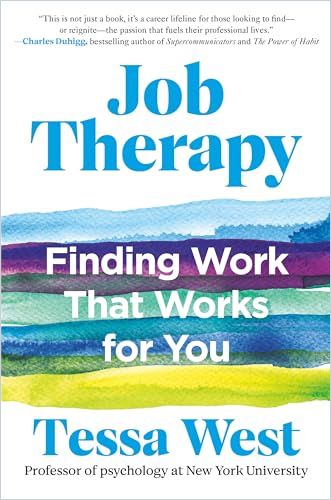Tessa West, a professor of psychology at New York University, explains the psychological roots of job dissatisfaction and helps you understand what career you really want.

Seeking Satisfaction
Tessa West, a professor of psychology at New York University, exposes the underlying reasons for job dissatisfaction and provides practical strategies to help you change your career trajectory.
Job Dissatisfaction
People tend to question their career choices after a period of dissatisfaction.
Our feelings about our careers are as rich and complex as the feelings we have about our relationships with our loved ones.Tessa West
Dissatisfaction arises when your career no longer feels central to your self-image, West writes, or when overwhelming workloads lead to feelings of helplessness and burnout, if you struggle to achieve promotions or raises, or if lack of acknowledgment or reward for excellent work leaves you feeling undervalued.
For example, Timothy, a technology expert, was passionate about his field, but struggled with on-the-job motivation and engagement. Yet he wasn’t ready to commit to a change. Timothy was in the early stage of an identity crisis.
Is your job central to your core sense of self? How much joy does it bring you? West recommends asking these questions at intervals over several months to measure whether your job is no longer central to who you are or no longer brings you joy.
For example, Mia, a marketing expert, loved coming to work before the COVID-19 pandemic and disliked the move to online-only interactions. Yet she became unhappy when the choice to return to in-person work coincided with other changes. One change was the shift to “hoteling” — meeting in different hotel conference rooms rather than at a dedicated office — which Mia felt degraded the workplace atmosphere. Other factors included budget cuts, layoffs, and restructuring decisions that left her feeling underutilized and out of sync with her colleagues.
I used to love my job, but I no longer recognize it.Tessa West
To determine where your disillusionment with your job began, document changes to your day-to-day work experience and how those changes affected your feelings about work. Consider organizational changes, such as leadership shifts, budget cuts, or new policies. Clarify how broader company decisions trickle down to shape your daily work life.
Reflect on how your preferences and needs may have evolved. Consider how your values, goals, and what you find meaningful at work have changed over time. Compile a list of these preferences, rank them by importance, and use this list to guide your job search.
Workload
Jake, a data analyst, was unexpectedly promoted to a director position. Instead of being excited about his new title and raise, Jake felt frustrated. The responsibilities and constant interruptions from team members that came with a leadership role meant Jake could not maintain his productive “deep work” sessions. Realizing he had stretched himself too thin, Jake took a leave of absence and searched for non-managerial jobs so that he could work as he preferred.
West advocates prioritizing the tasks or roles you enjoy that are essential to your career, such as team-building or autonomous working time. Organize your job into “working spheres” — broad categories of related tasks. This approach helps you stay focused and reduces the cognitive load of task-switching, leading to deeper job satisfaction and less burnout.
Underappreciated
If you feel underappreciated, find out why you aren’t receiving the rewards you think you deserve by seeking frank, critical feedback. Ask your boss about your performance, focusing on areas for improvement and how you can enhance your skills.
Engage with colleagues and industry contacts who hold or have held the positions you aspire to attain to learn which prior roles and experiences fueled their advancement. Understand the scarcity and competition for the roles you want by speaking to those who hire for that role. Set realistic expectations and strategies for advancement, West warns. This approach helps you identify whether structural barriers or personal missteps hinder your promotion prospects.
People who work hard and provide value for their companies may not receive the recognition their contributions merit. Consider David, for example: He conducted groundbreaking biology research for two decades, yet never received a significant raise. Or consider Christine, a CFO: She handles her primary job duties and also acts informally as her team’s conflict resolver. David and Christine possess valuable and rare skills that significantly help their workplaces, but don’t receive the recognition, compensation, or opportunities they deserve.
Observe how often others recognize your unique abilities. For example, if you regularly solve complex problems, but no one acknowledges your efforts, others may undervalue your skills. Compare your skills and background to your competitors.
If you can’t fix the issues with your current job, move on and find a better one, West writes. Before you send out résumés, make a list of your current skills. For each work task you perform, identify the skill required. For example, if you manage schedules, your skill might be “time management.” Describe a situation in which you used each skill: the task for which you were responsible, your actions, and the results you achieved. For example, if you improved your team’s productivity by implementing a new workflow, explain the challenge your team faced, your role in identifying the inefficiency, the steps you took to create and introduce the new workflow, and the positive outcome, such as a 20% increase in productivity.
It’s OK to have mixed feelings about leaving a job. You don’t need to be ready to leave before you start exploring.Tessa West
Reach out to individuals inside or outside your current industry or company to gain insights into any changes occurring within your industry. Broaden your network to discover opportunities you had not previously considered, but that align with your skills and interests.
Not Alone
West emphasizes the importance of understanding your emotions and how they affect your professional life. She argues that by proactively identifying and addressing the psychological factors driving your unhappiness at work, you can make more informed and fulfilling career choices that will lead to long-term personal and professional satisfaction. West’s numerous real-life examples clarify her strategies and deliver perhaps her most important lesson: You are not alone. West’s insightful strategies will help anyone break free of dissatisfaction and find a more fulfilling job.













